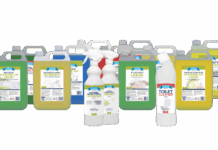Building business with cost-sector customers isn’t as simple as knocking on the door of a school kitchen or hospital. Here we’ve highlighted five important steps and a list of essential resources that will help any wholesaler to grow its business with cost-sector customers.
1: Find the decision makers
Tendering and procurement
One of the most important differences between working with cost and profit sectors is that many cost-sector contracts are negotiated through a tendering process. Decisions are made at head office by procurement consultants or a formal tendering process, depending on the size of the establishment.
European Journal for big business: 50% of Bidvest 3663’s business is in cost-sector contracts and it has a specific tendering team, because targeting multi-million pound contracts can take months to prepare. The company follows tenders that are announced in the European Union’s Official Journal of the European Community – all tenders above a certain financial threshold from the public sector must be published in the journal.
Procurement managers for specific sectors: It’s often the case that schools, prisons and local authorities have little expertise with foodservice wholesalers. Instead, they employ procurement managers to make decisions for them. Organisations such as Beacon Purchasing and Pelican Procurement act as consultants and advise businesses on which wholesalers to use.
This is the route that Bestway has gone down. It doesn’t use the European Journal because it is not specific enough – instead, it builds relationships with procurement specialists and applies for MEATs (most economically advantageous tenders).
The good procurement consultants and tendering organisations send tender alerts so that you know what’s coming onto the market a few months ahead of time. This gives wholesalers the perfect opportunity to start preparing for a tender in advance.
Procurement organisations: Contracts are also determined through the North East Procurement Organisation and other similar bodies, where single tenders are agreed using one contract covering a number of customers, such as schools or hospitals. To get in front of these organisations, you need to have a good understanding of when tenders are coming out.
2: Check your range
Gluten-free, diabetic and vegetarian diets
Do you have the range and availability that will be expected from your ever-demanding new customer base? This can be particularly challenging when you work with care homes and hospitals, where menus need to cover everything from allergies to serious health problems.
James Varghese, catering services manager at The Royal Brompton Hospital in Fulham, London, says: “Choice is really important when we decide which wholesaler to use. We always have a vegetarian option, a gluten-free option and one that’s easy to swallow.”
Dietary requirements are also critical for care home manager Sue Haynes at Stokefield Residential Care Home in Wokingham. “We use the wholesaler that is recommended to us by Galleon Care and food needs to be suitable for gluten-free, diabetic and vegetarian diets.”







